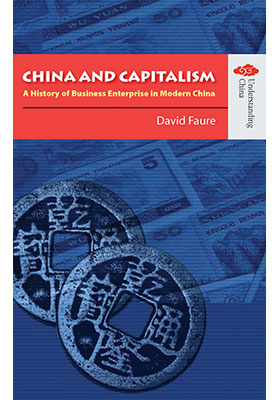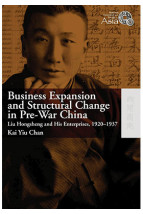China and Capitalism
A History of Business Enterprise in Modern China
(中國與資本主義:現代中國商業企業史)
ISBN : 978-962-209-784-1
Understanding China: New Viewpoints on History and Culture
January 2006
136 pages, 6″ x 7″
Ebooks
Also Available on
Written by one of the most distinguished experts on China’s economic and business history, China and Capitalism provides a highly original and at the same time clear and readable approach to understanding the development of business in China from 1500 to the 1990s. David Faure then uses the picture he has assembled to shed new light on the strengths and weaknesses of Chinese business today. The book is written to be accessible to people with little background in China or Chinese business practice.
Dr Faure describes three phases in the development of Chinese business from the sixteenth to the twentieth century. In the traditional phase, from the sixteenth to the eighteenth century, Chinese business relied on contracts as well as on ritual propriety. In the modernizing phase, from the second half of the nineteenth century to the first half of the twentieth century, Chinese business had to adapt to the introduction of company law and legal standards of accounting. In the contemporary phase, from the middle of the twentieth century to the present day, China emerged from a control economy to a vibrant market by embracing once again the changes introduced in the modernizing phase.
General readers, including students and teachers in courses touching on but not primarily devoted to the Chinese experience, will find in this book the most comprehensive account of China’s business development in the last five centuries and many insights into the workings of China’s modern business scene. Specialist readers will find a highly original approach to the history of business in China.
“This small book is a tour de force. In remarkably brief compass, David Faure identifies and addresses key issues in Chinese business history between 1500 and the present. For China specialists, he sets a research agenda covering five centuries, and for business historians outside the China field, he provides a sweeping synthesis that includes tantalizing comparisons between China and the West.” —Sherman Cochran, Hu Shih Professor of History, Cornell University
“In his usual strong and provocative style, David Faure provides fascinating new ideas on the reasons for China falling behind the West from the nineteenth century, and spans the 1949 divide with sharp observations on the historical origins of China’s contemporary economic problems and structures.” —Tim Wright, Professor of Chinese Studies, University of Sheffield
“This book offers valuable insights to both the historian and the economist seeking to understand the contrasting trajectories taken by China and the West. The comparison between the Western corporation governed by law and the Chinese family lineage governed by ritual goes to the heart of the difference between the two civilizations. It is a gem, sure to lend brilliance to many a future chain of scholarly argument.” —Leslie Young, Professor of Finance and Executive Director, the Asia Pacific Institute of Business, The Chinese University of Hong Kong
“Engagingly written by one of the most distinguished economic historians of China, China and Capitalism focuses on a central theme: why was China underdeveloped, and what was the role of the corporate economy in this underdevelopment? The book is a double success. It explores with great insight Chinese economic history from 1500, and interprets with real understanding the economic, social, and legal environments of China’s fluctuating economic experience before the ‘take-off’ of recent decades. This is a sophisticated and accessible book that will appeal to European historians as well as students of capitalism.” —Raj Brown, Reader in Business History, School of Management, Royal Holloway College, University of London




